It’s a gut feeling! – Improve your Gut Bacteria
Innumerable microorganisms colonize the human gastrointestinal tract playing a vital role concerning digestion and absorption of dietary components. They shape and regulate the immune system and metabolic responses. The gut microbiota consists of both, good and bad bacteria. Good gut bacteria are protective in function, they prevent unwanted weight gain, control inflammation and is responsible for overall digestive wellbeing.
Here are seven ways you can improve your gut bacteria
1) Don’t worry, be happy.
The gut microbiota is sensitive to stress. When you’re stressed your brain releases certain neurochemicals which can influence the response to a bacterial infection. Stress affects digestion and the nutrients absorbed by the intestine.
2) Unity in Diversity
Different food groups are good sources for various macro and micronutrients. A diet that has variety is associated with a more diversified microbiome, and a diverse microbiota is a healthy one. So eat all the different food groups. Now, this does not mean that one includes unhealthy/ junk food in their diet.
3) Eat your Veggies!
A diet high in fruits and vegetables provides high fiber content. This fiber not only promotes the growth of good bacteria but can also prevent the growth of disease-causing bacteria. Its important to add seasonal vegetables as they enhance your immunity.
4) Don’t Pop a Pill
Although Antibiotics are designed to target pathogenic i.e. disease-causing organisms, they also affect the gut bacteria. We see a decreased diversity in the microbiome after antibiotic treatment. Thus try and avoid antibiotics unless otherwise prescribed by your doctor.
5) Spice up your life!
There is evidence that culinary herbs and spices provide benefits to digestive health and immunity. The complex spices that flavor Indian food can aid digestion.
6) When in a Pickle, pick fermented foods
Fermenting food and beverage is an ancient practice. There is evidence that fermented food can modify the gut microbiota. Fermented food not only taste great but they also have multiple health benefits. It really is a win-win situation. Enjoy your yogurt, buttermilk, idli, dosa, pickles, kimchi, tempeh and other fermented products.
7) Prebiotics and Probiotics
In simple words, Prebiotics act as food for good gut bacteria, and Probiotics are made up of good bacteria that help keep your body healthy and working well. Fermented foods are examples of Probiotics. A few examples of Prebiotics would be bananas, onion, garlic, oats, barley etc. Remember that gut microbiome participates in vital processes including digestion, energy homeostasis and metabolism, the synthesis of vitamins and other nutrients, and the development and regulation of immune function.
The role of the microbiome in health and disease helps to provide a scientific understanding of key concepts in Ayurveda thus suggests periodic panchakarma cleanse and detox to improve your Gut Health.

